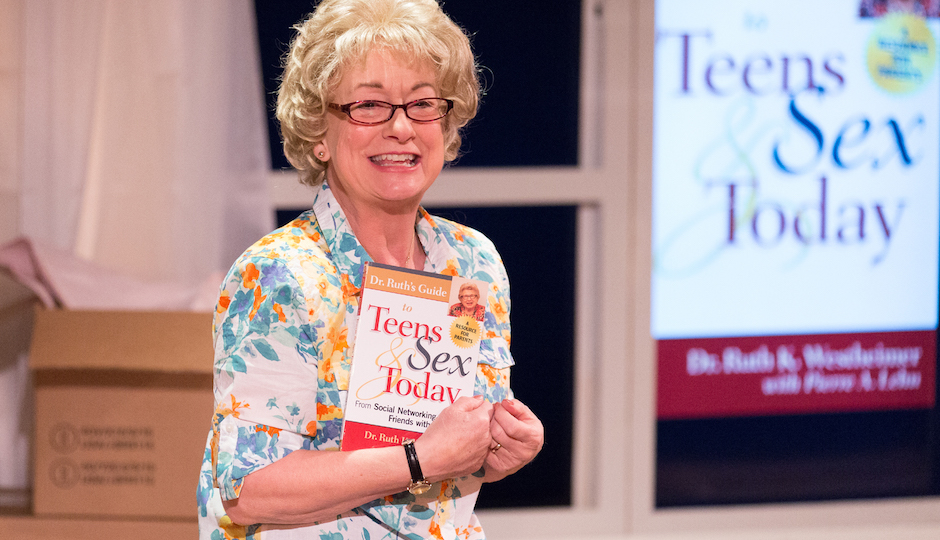REVIEW: Becoming Dr. Ruth at Walnut Street Theatre

Jane Ridley in “Becoming Dr. Ruth” at Walnut Street Theatre’s Independence Studio on 3. | Photo by Mark Garvin.
In the 1980s, America collectively fell head over heels in love with Dr. Ruth Westheimer. And why wouldn’t we? The diminutive German-born therapist was a character that no playwright would have the imagination (or chutzpah) to invent — possessing a combination of qualities almost too good to be true.
First, she was everybody’s favorite Jewish grandmother — compassionate, twinkly, stern when it was necessary — but mostly kind and full of folk wisdom and common sense. It was an archetype that recalled Gertrude Berg’s beloved Molly Goldberg character — but Dr. Ruth, being a real live person, was even better.
Then there was her sex advice — jaw droppingly candid, even embarrassing, but always somehow OK because it came from Dr. Ruth, the soul of respectability, and always dispensed with her signature quality of airy good cheer (Gemütlichkeit, as the Germans say).
Finally, she was a Holocaust survivor — narrowly rescued through the efforts of Kindertransport, which brought her to Switzerland, Westheimer (born Karola Siegel) lost her home and most of her family. That she could appear so confident, so indomitably cheerful, was a lesson to us all.

Photo by Mark Gavin
It is that person — and that spirit — we see in playwright Mark St. Germain’s solo drama, Becoming Dr. Ruth. At the Walnut Studio, Westheimer is played by Jane Ridley, a resourceful actress with expert timing, who looks and sounds plausibly like the character. The intimate venue is a real plus — Ridley converses with the audience as naturally as if she’s known us for years. In the course of 90 minutes, a stream of banter chronicles her ups and downs, and the evening passes quickly and pleasantly.
I could end my review here, and I’m sure that many attendees won’t ask for more.
Yet I found myself unsatisfied. Perhaps my problem is, in fact, with Dr. Ruth herself, more than the play. In her media heyday, I too was besotted with her charm — but I also never quite believed it. Westheimer’s background involved horrific, unimaginable loss — surely that part of her life remains with her — something darker and more complicated than the smiling façade reveals.
St. Germain’s script includes many references to the Holocaust, and the opening night audience was clearly moved by them. But only in the last few minutes do we get a glimpse of how deeply Westheimer’s character was shaped by her experiences of violence and loss, and what an effort it was — and is — to “become Dr. Ruth.” And then it’s gone.
Becoming Dr. Ruth has considerable entertainment value, but in the end, it’s frustrating. The set — a recreation of her Manhattan living room — includes no fewer than six doll houses (playing with dolls, we’re told, was among the ways Karola came to grips with her lack of living family). But the play itself is also a kind of doll house — a scaled-down replica of a real life that surely is bigger, messier, and more interesting.
Becoming Dr. Ruth plays through December 27th at Walnut Street Theatre. For tickets and more information, go here.
David Fox teaches theater and runs academic programs at the University of Pennsylvania. For 16 years, he was theatre critic for the Philadelphia City Paper; he has also written for The New York Times and other publications. He also blogs on arts topics at recliningstandards.org.
Read more of our reviews of shows playing now in Philly:
- A Christmas Story at Walnut Street Theatre
- Matilda: The Musical at Academy of Music
- Lantern Theater’s Underneath the Lintel
- Azuka Theater’s Lights Rise on Grace (closes November 22nd)
- Equivocation at Arden Theatre Company
Keep up to date with Ticket’s local arts, culture and events coverage. Here’s how:


